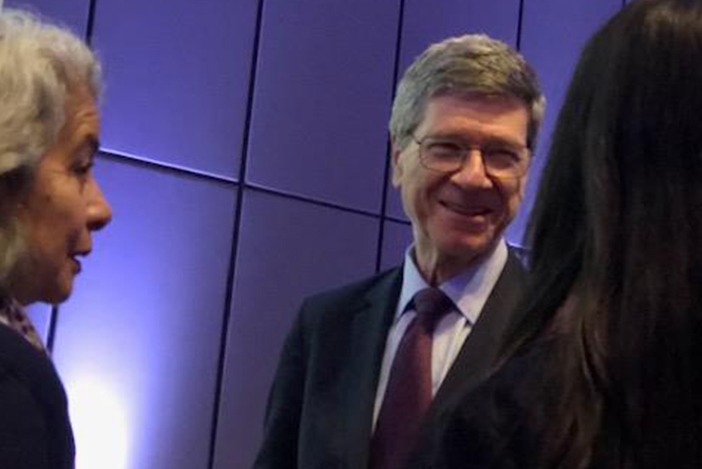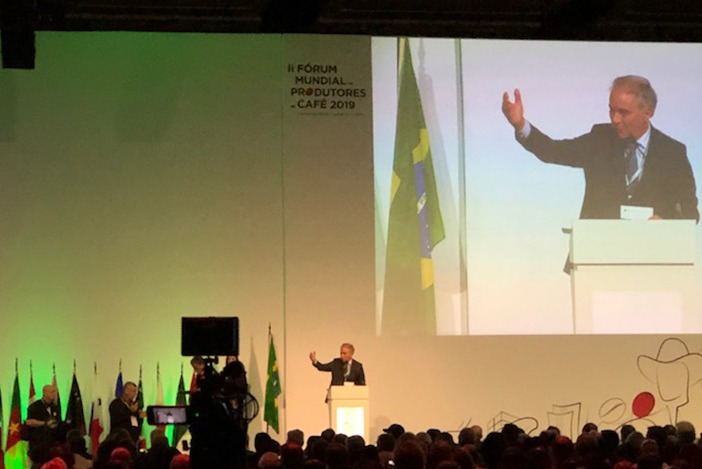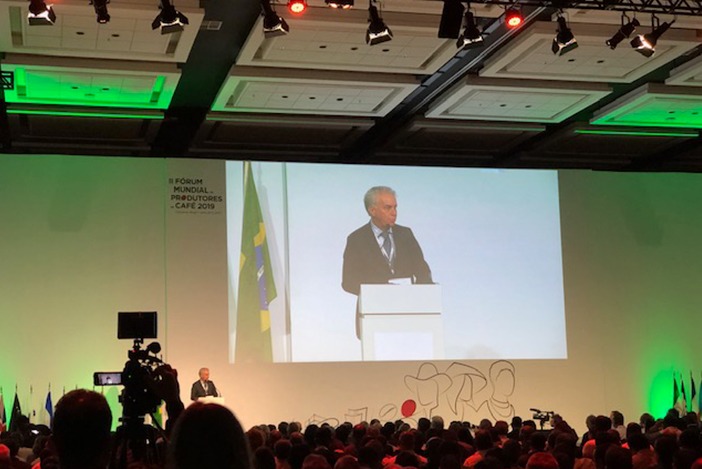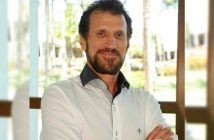Updated: 16/07/2019

Jeffrey Sacks
The amount invested would be passed on by companies such as Nestlé and GDE, which together with eight other global brands, billed US$ 200 billion and made a profit of US$ 20 billion last year
The II World Forum of Coffee Producers 2019 began in Campinas, São Paulo, on 10 October, with the presence of producers from all producing countries. Faced with the important vote of the Social Security Reform, neither President Jair Bolsonaro nor agriculture minister, Teresa Cristina, were able to attend the event.
Professor Jeffrey D. Sachs, an American economist known for his work as an economic advisor to several governments in Latin America, Eastern Europe, the former Soviet Union, Asia, and the United States, of Africa, gave a speech. Jeffrey presented the results of the economic sustainability study of coffee production, which will guide the claims of the world’s producers to the large industry.
Representatives from producing countries such as Colombia, India, Ethiopia and Uganda attended the opening of the meeting and, without exception, spoke out in favor of tougher negotiations with the large industry.
Impact of climate changes and the creation of a Global Investment Fund
Professor Jeffrey D. Sachs, director of the University of Columbia’s Center for Sustainable Development at Columbia University, presented the results of his work on the economic sustainability of coffee production in the world.
According to Sachs, the diversity in coffee production in the world is seriously threatened by global warming. “The producing regions are experiencing a significant increase in their temperatures, around 0.2°C every decade. Many areas of the producer belt will no longer be able to produce coffee. This will greatly reduce world production. Perhaps, countries such as Brazil and Vietnam can continue to increase their market share – together they accounted for 83% of the increase in global coffee production since 1995 – producing thanks to their high productivity rates but with risks to the production chain, with a higher concentration of coffee production in few countries. However, other producing countries, such as Colombia, India, Malaysia, Costa Rica, Madagascar, Thailand, among others that have low prices, low productivity, little investment and almost no research, will not be able to keep up, reducing the diversity of species and flavors in the cup,” said Sachs.

The II World Forum of Coffee Producers 2019
On the other hand, the professor stressed that Brazil is not immune to the consequences of global warming, since it is one of the largest agricultural powers in the world.
The result will be that small producers in poorer countries will remain in extreme poverty, child labor will continue to be a reality, there will be increased deforestation and limited access to basic services such as drinking water education in coffee producing areas will remain. In other words, global coffee production will not achieve sustainability.
Another alarming finding presented by Professor Sachs is that, in the last two years, there has been a considerable increase of producers below the poverty line.
How to combat such a dark future?
Professor Sachs’ study also shows the other side of the coin: continued and significant gains in profits from major industry players such as Nestlé and Jacobs Douwe Egberts, which holds 40% of the global market share. The other companies with significant market shares are Lavazza, J.M. Smucker, Kraft Heinz, Tchibo, Strauss / São Miguel, Kapal Api Group, Keurig Dr. Pepper (also owned by JDE) and Dongsuh Foods.

The II World Forum of Coffee Producers 2019
“The world coffee industry earned US$ 200 billion and made a profit of US$ 20 billion,” says Sachs. But at the expense of stress, risk, poverty and inequality. “The solution requires great public and private investment, says the professor.
His proposal for the sector is the creation of a Global Coffee Fund that, in his opinion, would have a board with the participation of the entire coffee production chain, which could manage investments of US$ 10 billion per year and which would be distributed to the countries and producers with lower incomes, so as to guarantee an increase a worldwide productivity increase and the due political pressure in the fight against global warming. “It looks like a lot, but it’s less than a penny for each cup of coffee sold. Just do the math: about 800 billion cups are sold per year. This money would remedy the widespread lack of access to basic social services, such as out-of-school children and healthcare that is not appropriate. The puzzle is how to bring resources to coffee producing regions, especially those with low incomes,” he adds.
For the idea of the Global Fund to get off the ground, the industry needs to mobilize, since they would be the main ones impacted by the reduction in world coffee production. With the industries leading the management of the Fund, the governments of producing countries and international donors would have a space to discuss solutions and provide resources that would be used to help the most critical places,” he says.
“The Global Coffee Fund is a feasible proposal, as it will be the Fund’s role to invest socially in schools, healthcare, and insurance against climate change. It is the industry’s role to prioritize social protection and increase productivity,” he argues.
Sachs hopes that companies and donors will soon be joining and financing national strategies, starting with the poorest countries.
What the industry thinks about the proposal
Here is JDE’s position: this is one of many proposals and efforts to support all coffee producers; some are very successful while others are experiencing many difficulties. Any global fund needs to ensure that consumers, governments of consuming countries and all those who benefit from coffee also support farmers and that they know how to distinguish those who need it the most from those who do not need it.
“Professor Sachs has compiled known and available information to support the creation of a global fund to support coffee growers. I believe that a fund of this nature, if established, should not be welfare-oriented, but rather pre-competitive and aiming to foster initiatives that increase consumption, research, innovation and development based on: (1) a continuous diagnosis of social and environmental sustainability indicators in producing regions; (2) the extension and access to quality technical information; and (3) the microfinancing of production factors for small producers, such as inputs and machinery that allow access to FOB values of the same order in Brazil, at around 85%. The fund cannot be a source of productive inefficiency.”
Low coffee prices
The long economic crisis in Brazil is also responsible for the low price of coffee worldwide. “When the Brazilian currency is weak, coupled with a strong dollar, commodity prices tend to be even lower. And the small producers in the rest of the world, who have low productivity, feel the effects of the low price of coffee even more,” he concludes.



